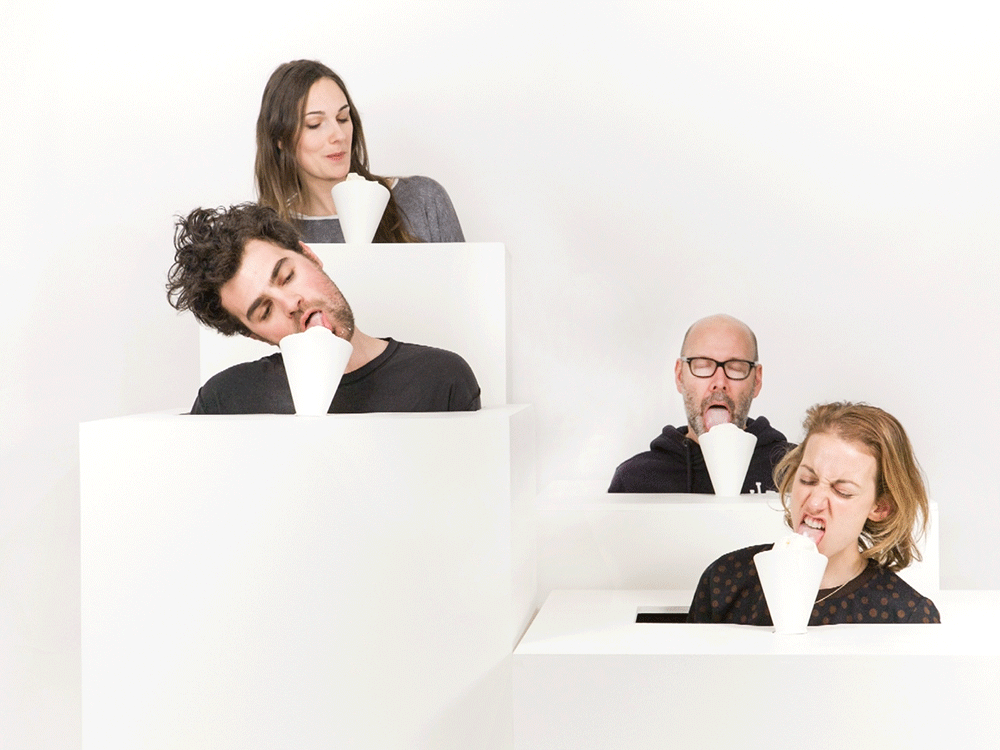冰淇淋既可以作为赢得小联赛的奖励,也可以用来抚慰分手后的悲伤。然而,在美食极客的手中,冰淇淋还可以成为一种美味的乐器。设计师Carla Diana和Emilie Baltz近来发起了一场音乐表演,一群四重奏演奏者聚集在一起,仅用一夸脱香草冰淇淋和一些高科技蛋筒进行表演。
3D打印的蛋筒中有电容式传感器,而蛋筒被安放在一个基座型的箱子上面。乐手们站在箱子里,两臂放在身旁,用舌头舔冰淇淋。当舌头接触到这个奶油冰淇淋时,信号就会被传导到隐藏其中的Arduino板中,然后板上的软件把信号转化成声音,最后由话筒输出。
这一“舔乐乐队”精心创作了一首由四部分组成的曲子,声音中充满了对冬天的冰柱和易打滑的冰面的回忆。四名表演者各在曲子中扮演一个角色,只要用不同的方法舔冰淇淋就能发出或短促有力的声音或长久的乐句。
起初选择香草冰淇淋只是为了保持基座与蛋筒的色彩和谐,让演奏者的表演更有力。但是Diana和Baltz与Big Gay冰淇淋店合作为表演者们制作了一款新的香草味,其中加入了辣椒。Diana说,“我们发现冰淇淋中辣椒的辣感让演奏者在舔的时候更有力,因此演奏也更加热情洋溢。”
据说,舔乐乐队不久就会开始巡演。

Ice cream can be the reward after a successful little league game, a consolation after a bad breakup, or, in the hands of gourmet geeks, a sweet musical instrument. Designers Carla Diana and Emilie Baltz recently whipped up a musical performance where a quartet of players jammed using just a quart of vanilla ice cream and some high-tech cones.
Capacitive sensors were embedded in 3-D printed cones that were perched atop pedestal-like boxes. Musicians stood inside the boxes, arms at their sides, and licked away. When a tongue made contact with the creamy treat a signal was sent to a hidden Arduino, assigned a sound by onboard software, and pumped out through speakers.
Lickestra’s secret ingredient was cayenne pepper. “We found that the heat of the spice in the ice cream elicited a much more vigorous licking action and inspired some rather gusto-filled performances,” says Diana.
While Gene Simmons was born to play these instruments and Ben & Jerry would seem to be natural collaborators, Diana and Baltz teamed up with Buke & Gase, a musical duo known for their work with unusual instruments to help establish the sound. The brief was simple: translate licking into music. “They crafted a four-part composition of music that included sounds reminiscent of winter icicles and slippery surfaces,” says Diana. Each Lickestra performer was assigned one sound from the composition and could play it as a short burst or longer musical phrase by simply licking the ice cream in different ways.
Diana and Baltz’s studio was a cross between a Michelin rated kitchen and a mad scientist’s lab. In order to make the performance successful, the tech had to be hidden and great pains were taken to ensure the wires were all hidden inside the cones. They also had to become experts at packing the ice cream into the instruments to ensure that the circuits would be complete throughout the show. “We faced many challenges throughout the development of the Lickestra, but that just meant eating more ice cream until we had things resolved,” says Diana.
Vanilla ice cream was originally selected to maintain visual harmony between the pedestals and cones, and to make the movements of the performers more impactful. However, Diana and Baltz partnered with the Big Gay Ice Cream shop to develop an original flavor for the performance which was infused with Cayenne peppers. “We found that the heat of the spice in the ice cream elicited a much more vigorous licking action and inspired some rather gusto-filled performances,” says Diana.
The debut performance occurred at Specials on C, an art space that fittingly bills itself as a “bodega” for community and expression. “It was pretty spectacular to see how creative people could get when challenged to showcase creative licking in public,” says Diana. “Some people are quite the show-offs when it comes to tongue acrobatics. We observed lickers that were naughty, sculptural, rhythmic and ballet-like.” No matter how the artists approached their musical ministrations each lick produced a sound from the speakers accompanied by laughter, applause, and a sprinkling of giggles from the audience.
According to Diana, Lickestra will soon begin touring and more musicality might be on the menu. “We had sonic marzipan that could be smooshed, audible cocktails that could be sipped through conductive straws, and metal forks and spoons that would trigger tones when used to pierce food,” says Diana. “We discovered that the experiences that triggered sound through interaction with the tongue, teeth and mouth were the most magical and surprising, so we decided to focus on that for our public performances.”
Humorous undertones aside, the performance was a very serious effort to focus design thinking on the problem of overstimulation and underutilized senses. “The Lickestra was created to serve as an experiment in isolating a single gesture and understanding how one sense, such as taste, can be amplified by combining it with another sense, such as hearing,” says Diana. “The sensory experience from the interaction we created may get used in a consumer electronics product, a food item, a cocktail, or another art piece. We’re still exploring the power of tongue-based expression”.
(来源:中国日报爱新闻iNews 编辑:丹妮)
